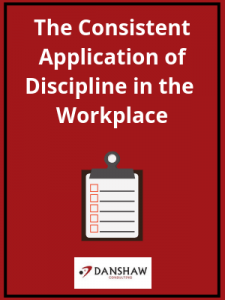Workplace Discipline and the Importance of its Consistent Application

Workplace Discipline and the Importance of its Consistent Application

Many employers have found themselves on the receiving end of CCMA or Labour Court orders compelling them to reinstate employees who have been dismissed due to inconsistent application of workplace discipline.
The effect of a reinstatement award is that the employee returns to work as if there was no break in service and may be entitled to receive “backpay” for the period when he was out of work, which could be months or even years.
It can thus be a costly exercise for the employer, resulting from a mistake that could easily have been avoided.
Employers needs to understand the meaning of consistent application of discipline in the workplace from a labour law perspective to ensure that they are not at risk.
1. Consistency means that all employees who commit the same transgressions must be treated the same way.
This does not necessarily mean that employees will always receive the same sanction for a transgression as mitigating and aggravating factors which may be unique to each employee must also be considered when sanctions are issued.
For example, an employee with 5 years’ service with a company and an unblemished disciplinary record may receive an appropriate warning for being absent from work for more 3 days, whilst an employee with 5 weeks’ service may be dismissed.
Other factors to be considered include the employee’s disciplinary record, circumstances of the transgression, whether the employee is remorseful, the quantum of the damage caused and ultimately the effect it had on the trust relationship between employer and employee.
It is thus clear that employees must be treated equally in the sense that disciplinary steps need to be taken against any employee who breaks a rule, but the eventual sanction may differ.

2. Consistency means that the employer must apply a rule and take action every time when the rule is transgressed.
For example, if the employer does not take action against employees who arrive marginally late for work, he cannot all of a sudden start issuing warnings when an employee arrives for work a couple of minutes late.
By not taking action in the past, the employer leads employees to believe that the behaviour is condoned or that the employer does not regard it as serious enough to warrant disciplinary action.
This does not mean that the employer cannot take action for poor time keeping, but before doing so the rule needs to be reinforced by communicating to employees that the specific behaviour will lead to disciplinary action being instituted.
Previous Judgements
In the recent judgement of SACCAWU vs Sun City (2018) 39 ILJ 436 (LC) the court found that the employees who acted wrongfully and was dismissed should not escape their punishment merely on the grounds that there are others who have done the same and they were not dismissed.
Whilst this approach by the court is welcomed by employers, it needs to be reiterated that consistent application of discipline is an important element in disciplinary action, and the consequence if it is not adhered to can be costly.

Some practical steps to be taken to ensure that workplace discipline is applied consistently include:
- Implementing a disciplinary code stipulating what sanction will be attracted by a specific transgression.
- Keeping proper records of sanctions that have been issued.
- Giving training to individuals who are initiating disciplinary hearings to ensure that they understand the requirements and elements of fairness as well as the content of the company’s disciplinary code.
- Conducting a proper investigation when taking disciplinary action to establish who was involved in the transgression and to ensure that action is taken against all involved and that no employee is unfairly singled out.
Employment relationships are governed by laws and the interpretation and application of these laws can be difficult.
It is always advisable to contact your labour advisers for guidance prior to making a final decision.









